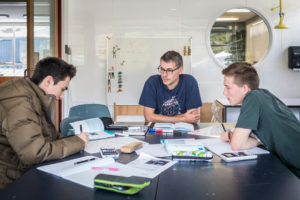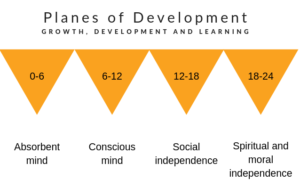By Michael Draper —Physics Teacher
An important concept in Montessori philosophy is the role of concentration in the development of the child:
“The first essential for the child’s development is concentration. It lays the whole basis for his character and social behaviour. He must find out how to concentrate, and for this he needs things to concentrate upon. This shows the importance of his surroundings, for no one acting on the child from outside can cause him to concentrate. Only he can organize his psychic life.” (Maria Montessori, The Absorbent Mind, 1949 translated 2007, p.202).
“Without concentration it is the objects about him which possess the child. He feels the call of each, and goes from one to another. But once his attention has been focused, he becomes his own master and can exert control over his world.” (ibid p.197-198).
She goes further to say that the process of concentration is restorative to a child’s overall wellbeing (“As soon as the ability of fixing the mind on real things is acquired, the mind will return to its state of health, and begin again to function normally.” ibid p.243). I have seen this ‘miracle’ in action both with my students and with my own children – when they become engrossed in work, any listlessness or contrariness falls away and their vitality and joy is apparent.
Maria Montessori observed that ‘occupation’ in tasks was not sufficient and that true ‘concentration’ was required for healthy development (“because if the children go indifferently from one thing to another, even if they use them all properly, this is not enough to remove their defects.” ibid p.188). She also identified the consequences of interrupting the pattern of concentrated engagement for a child (“If his cycle of activity be interrupted, the results are a deviation of personality, aimlessness and loss of interest.” ibid p.146), and gives explicit instructions to teachers “not to interrupt the child” when they are concentrating on their work (ibid p. 248-9 and 182 respectively).
The purpose of a Montessori school, therefore, is not to keep children busy, but to provide an environment where ākonga engage in interesting work. Once engaged, it is our job as teachers to enable ākonga to pursue their work free from interruption. (As a Montessori teacher, one of my challenges is to hold off from automatically assisting my students and instead wait for when my involvement will support their concentration rather than interrupt it.) This need for concentration also explains why we limit the number of transitions in the school day to give ākonga more time to focus on their own work.
Maria Montessori’s specific advice to parents? “Their children need to work at an interesting occupation: they should not be helped unnecessarily, nor interrupted, once they have begun to do something intelligent.” (ibid p.182).
Maria Montessori wrote these observations in the 1940s, when electronics technology was in its infancy. If she were working now, I wonder what her advice would be regarding children and concentration in our Information Age?

